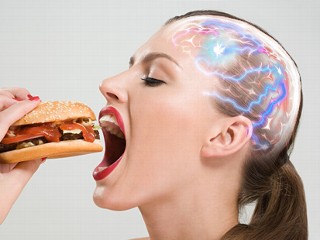Food Addict or Just Really Like to Eat??

Soulful Living
Food Addiction Part 1
(Part 1 of this article originally appeared in the WLS Lifestyles Magazine in my Soulful Living Column)
Louisa Latela, LCSW, LCADC
Of my clients who struggle with compulsive eating those who have a strong desire to live a joyful, healthy, peaceful life are the most successful in moving from living in the insanity of food obsession to the serenity of a healthy relationship with food and weight. This is because a highly respected and well-nourished body is the foundation upon which such a life must be built. When a person who is overweight and/or a compulsive eater desires to feel good physically, emotionally, and spiritually her motivation to make peace with her body and food is multidimensional; it is not simply wanting to see a particular number when she steps on the scale. It ‘carries with it more weight’ (pun intended!). However many people do not understand that what they eat directly affects their every experience. Do You? Take some time to think about how your weight and relationship with food affect the following areas of your life:
Physical Health: Are you overweight? Do you have heart disease, diabetes, shortness of breath, sleep apnea, decreased energy, or chronic joint pain? Are there other ways that your weight and food consumption affect you physically?
Emotional Health: Do you harshly judge yourself; feel shame, guilt, anger or self-hatred in relation to your weight or what you eat? Do you experience periods of depression because of your inability to control your eating behavior? Do you ever feel anxious if you do not have certain foods available to you?
Finances: How much money do you spend on food that you use for bingeing, overeating, or avoiding uncomfortable feelings? How much money have you spent on diet books, diet supplements, diet foods, consultations with weight loss professionals, and seldom used exercise equipment and gym memberships? Do you miss time at work because of health problems related to how you eat? Do you believe your weight prevents you from getting a promotion or new job? Are there times that you are not as productive at your job because of how you feel (emotionally or physically) in relation to what you did or did not eat?
Relationships: Do you use your weight as an excuse to avoid relationships? Or, conversely, have you ever stayed in an unhealthy relationship because you believed no one else would want someone your size? Are people in your life inconvenienced by your food related emotional or physical problems? When you eat foods that zap your energy or make you feel ill, are you sometimes nasty, short, or cranky with family, friends, or co-workers?
Sexual Experiences: Does your weight physically or emotionally prevent you from having a satisfying sex life?
Mental Clarity: Do you ever feel a bit dull or foggy in the brain because of the quantity or quality of food you eat?
Activities: Does your weight physically or emotionally prevent you from engaging in healthy, fun activities like hiking, bike riding, swimming, dancing, or playing with your children? Are simple activities of daily living like putting on your socks and shoes becoming increasingly difficult? Do you avoid certain social situations because you don’t want to be seen at your current weight or because you are afraid you will overeat?
Time: How much time do you spend thinking about food or weight issues? How old were you when you first thought you had a problem with food or weight? How many years have you been dealing with this? How many precious moments of your life have you lost to your preoccupation with food and weight?
The purpose of answering the preceding questions is to not elicit feelings of self-blame or harsh self-judgment but rather to increase your awareness of how your current weight and eating behaviors may be preventing you from living a normal, productive life. Understanding that what you eat affects your every physical, emotional, and mental experience can serve to increase your motivation to cultivate a healthy relationship with food.
If you are still riding the yo-yo dieting roller coaster you may have an addictive relationship with food.
Addiction, as defined by Merriam-Webster’s Medical Dictionary, is “the persistent compulsive use of a substance known by the user to be physically, psychologically, or socially harmful”. Sound familiar? Studies have shown that compulsive overeating and drug addiction share many of the same biological characteristics. For instance, when people eat large quantities of sugar and fat they develop a tolerance for these substances and need more sugar and fat to satisfy them, much like alcoholics and drug addicts who, over time, require increased amounts of alcohol and drugs to get high. Other research has revealed that many obese people and drug addicts have a lower number of dopamine receptors (the feel good receptors) in their brains which make them more likely to crave things that boost dopamine like sugar, alcohol, cocaine or heroin. Also when some people are suddenly cut off from sugar and certain carbohydrates they experience withdrawal symptoms like anxiety, depression, irritability and strong cravings for the substance from which they are cut off, just like alcoholics and drug addicts do when they are detoxifying from alcohol or drugs.
However; neither acknowledging the depth to which your relationship with food is negatively affecting your life nor understanding the biology of addiction will in and of itself cure your obsession or right your relationship with food.
You may be thinking “Well I know how to eat well and what I need to do to lose weight.” Do you really? The definition of insanity is doing the same thing over and over again and expecting a different result. How many times have you gone on a diet proclaiming “This is it! I will never again be overweight! My eating behaviors have forever changed!!” only to find yourself starting a new diet the following Monday morning? Three, four, five or more times? Sounds like insanity to me! You may know how to diet and temporarily lose weight, but you have not made the internal psychological and emotional shifts necessary to sustain a healthy relationship with food and permanent weight loss. Moving from the insanity of a food and weight obsessed life to the serenity that a loving and respectful relationship with food affords you requires the willingness to consider a new way of thinking and being in the world.
For many it requires learning to live a spiritual life.
Cultivating a relationship with your Authentic Self, looking at yourself through kind and compassionate eyes, being willing to listen to and act on the guidance you receive from your Inner Knowing, and understanding that your true essence is pure love are all part of nurturing your spiritual self. As you mature spiritually, behaviors that no longer serve you will fall by the way side.
On page 15 of “A Course in Weight Loss” Marianne Williamson writes:
“Spiritual growth is a fascinating process if you allow it to be. It is an inner journey from one insight to another, in which helpful realizations fall into place as you are ready to receive them. Twisted thoughts become untwisted once you see them for what they are. Your journey from blindness to spiritual vision precedes your journey from dysfunctional eating to a healthy and wholesome relationship to food; in fact it is a necessary prerequisite for it. As you understand more deeply the roots of your weakness you lay the foundation for the cultivation of new strengths.”
To be continued.....
What a terrific reminder of the "cost" of obesity from so many different perspectives. Great article!
I think the problem with some like me is that after you conquer all those demons you still are hungry all the time.
There are some very real physiological reactions to the foods we eat. A lot of us may find ourselves to be emotional eaters and tied to the feelings we have when we reach for certain foods and we there by become addicted to those food choices to help us deal with an emotion which in turn causes a physical reaction. That is what we are craving.
By acknowledging, accepting and changing our thinking we are one step closer to breaking the addiction we have with food, and the choices of food we use to medicate ourselves.
Great Article thanks for sharing.
Loveit2012,
If you are truly physically hungry it may serve you well to meet with a bariatric nutritionist who can review your meal plan and make suggestions as to how you might alter it so as to minimize your hunger. If you follow the post surgery eating guidelines and are still physically hungry you may want to have a consult with your surgeon.
However if you find that you are not actually physically hungry, but just feel an "emptiness inside" therein lies emotional hunger. I would encourage you to give yourself the time and space to contemplate the question "What am I truly hungry for?" grounded in the energy of compassion and curiosity. If you make it a point to spend time each day to connect with you inner knowing, you will come to know what it is your heart/soul is truly longing for….i.e. what kind of nurturing you are really craving… and remember to be loving and kind and patient with you…
Well I'm pre op so I think that's the problem! I can't wait to get my sleeve.
i ate sometimes because i felt like i had a big empty hole inside
and the more food, the better chance of filling it where in reality, it only filled out my britches
almost to the point where i was wearing skirts to fit around my girth..
i am not addicted to food..we must eat to live
i was a volumn eater and by my WLS, it has helped with that
i now choose to eat better things since i cant eat but so much
and now fill that empty hole with (living)
great article
love reading the wide variety of responses
Edited by ☠carolinagirl☠







KristinaRnY 455
Posted
Thank you so much for sharing this.
Share this comment
Link to comment
Share on other sites